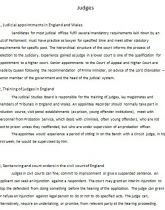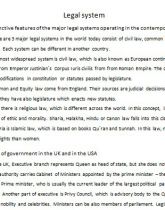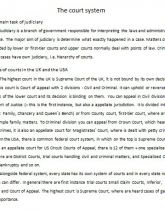Vypracované otázky: Angličtina - materiály ku skúške
Skryť detaily | Obľúbený- Kvalita:84,8 %
- Typ:Vypracované otázky
- Univerzita:Univerzita Komenského v Bratislave
- Fakulta:Právnická fakulta
- Kategória:Humanitné vedy
- Podkategória:Právo
- Predmet:Úvod do anglickej právnej terminológie
- Študijný program:1. Ročník BC denná forma
- Autor:otazky123
- Ročník:1. ročník
- Rozsah A4:18 strán
- Zobrazené:1 454 x
- Stiahnuté:2 x
- Veľkosť:0,1 MB
- Formát a prípona:MS Office Word (.docx)
- Jazyk:anglický
- ID projektu:46872
- Posledna úprava:23.01.2017
Legal system
1, The distinctive features of the major legal systems operating in the contemporary world
There are 3 major legal systems in the world today consist of civil law, common law and religious law. Each system can be different in another country.
The most widespread system is civil law, which is also known as European continental law. It`s derived from Emperor Justinian`s Corpus Iuris civilis from from Roman Empire. The central sources are codifications in constitution or statutes passed by legislature.
Common and Equity law come from England. Their sources are judicial decisions in the court. Besides this, they have also legislature which enacts new statutes.
Then there is religious law, which is different across the world. In this concept, law also covers codes of ethic and morality. Sharia, Halakha, Hindu or Canon law falls into this class. For example Sharia is Islamic law, which is based on books Qu`ran and Sunnah. In this law, men have much more rights than women.
2, Branches of government in the UK and in the USA
In the UK, Executive branch represents Queen as head of state, but she does not really govern. The authority carries Cabinet of Ministers appointed by the prime minister - the head of government. Prime minister, who is usually the current leader of the largest political party in House of Commons. Another part of executive is Privy Council, which is advisory body to the Queen consisting of nobility and celebrities. Ministers can be also members of parliament. Legislative branch; Westminster Parliament has two chambers, which sit separately. House of Commons is an elected body; House of Lords are mainly appointed members, replacing older hereditary peers. Judicial branch: Supreme Court of the UK (established in October 2009 taking over appellate jurisdiction formerly vested in the House of Lords is the final court of appeal).
(United Kingdom of Great Britain and Northern Ireland is, in contrast to the USA, constitutional and unitary monarchy. There is no written constitution, but constitutional law consists of statute law, common law and constitutional conventions.)
Unlike the UK, the USA has written constitution, the oldest lively constitution in the world. It defines the three main branches of federal government and specifies theirs duties: a legislature, the bicameral Congress, consisting of Senate and House of Representatives, executive branch led by the President, although power is often delegated to the Cabinet members and other officials; and a judiciary branch headed by the Supreme Court. USA a federal constitutional republic comprising fifty states and a federal district.
1, The distinctive features of the major legal systems operating in the contemporary world
There are 3 major legal systems in the world today consist of civil law, common law and religious law. Each system can be different in another country.
The most widespread system is civil law, which is also known as European continental law. It`s derived from Emperor Justinian`s Corpus Iuris civilis from from Roman Empire. The central sources are codifications in constitution or statutes passed by legislature.
Common and Equity law come from England. Their sources are judicial decisions in the court. Besides this, they have also legislature which enacts new statutes.
Then there is religious law, which is different across the world. In this concept, law also covers codes of ethic and morality. Sharia, Halakha, Hindu or Canon law falls into this class. For example Sharia is Islamic law, which is based on books Qu`ran and Sunnah. In this law, men have much more rights than women.
2, Branches of government in the UK and in the USA
In the UK, Executive branch represents Queen as head of state, but she does not really govern. The authority carries Cabinet of Ministers appointed by the prime minister - the head of government. Prime minister, who is usually the current leader of the largest political party in House of Commons. Another part of executive is Privy Council, which is advisory body to the Queen consisting of nobility and celebrities. Ministers can be also members of parliament. Legislative branch; Westminster Parliament has two chambers, which sit separately. House of Commons is an elected body; House of Lords are mainly appointed members, replacing older hereditary peers. Judicial branch: Supreme Court of the UK (established in October 2009 taking over appellate jurisdiction formerly vested in the House of Lords is the final court of appeal).
(United Kingdom of Great Britain and Northern Ireland is, in contrast to the USA, constitutional and unitary monarchy. There is no written constitution, but constitutional law consists of statute law, common law and constitutional conventions.)
Unlike the UK, the USA has written constitution, the oldest lively constitution in the world. It defines the three main branches of federal government and specifies theirs duties: a legislature, the bicameral Congress, consisting of Senate and House of Representatives, executive branch led by the President, although power is often delegated to the Cabinet members and other officials; and a judiciary branch headed by the Supreme Court. USA a federal constitutional republic comprising fifty states and a federal district.



